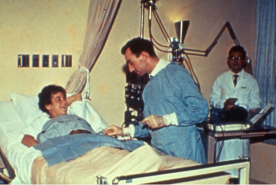Many people feel that a successful kidney transplant offers a better quality of life than dialysis. To be considered for one, you must be evaluated at a transplant center. This is done to make sure that a kidney transplant is the best choice for you. The evaluation will be very thorough, and may take several months to complete. You will meet with members of the transplant team, which may include a transplant surgeon, nephrologist, nurse coordinator, social worker, financial coordinator, and dietitian. Your transplant team will need to know a lot about you to help them—and you—decide if a transplant is right for you.
How will the transplant center begin my evaluation?
Most centers have an intake coordinator who will speak to you over the phone and start process. The coordinator will get basic information and then send you a questionnaire to complete. Your insurance company will be contacted to make sure they will cover the cost of the evaluation and transplant surgery at the center. If you are on Medicare, the transplant center will contact Medicare for authorization.
The next step is an initial visit. You will meet with several people at the transplant center. They will discuss the transplant process with you, and review your physical, psychosocial, and financial needs. The evaluation process can be an exciting and very busy time. You can best help with the process by getting all your testing done as quickly as possible.
What does the evaluation involve?
Each transplant center has its own guidelines for deciding if you are a good candidate for a kidney transplant. However, at every center, you can expect to have:
- A medical and surgical history. The transplant team will review your medical history carefully. You will be asked about any illnesses, surgeries, and treatments you’ve had in the past. You will also be asked about your family’s history. If any problems are found, they will be looked at further.
- A physical exam. The transplant team will need to make sure you are healthy enough for transplant surgery, and that a transplant is the best choice for you. They will examine all your major organs and body parts.
- A psychosocial exam. Getting a new kidney has many benefits – but it also has some risks. One purpose of the psychosocial exam is to make sure you are emotionally prepared for the surgery, post-transplant care, and for living with a new kidney. You and your family may have some unexpected feelings during this journey. The psychosocial exam helps make sure you will be able to cope with the physical and emotional aspects of your transplant.
- Compatibility tests. The transplant center will need to know your blood and tissue type in order to match you to a suitable kidney. A sample of your blood will be taken, and the following tests will be done:
- Blood typing. It is easiest to get a kidney from a donor whose blood type is compatible with yours. There are four main blood types: A, B, AB, and O. Everyone fits into one of these types. Although getting a transplant from an incompatible blood type is possible in some cases, it requires additional medical treatment before and after transplant to reduce the risk of organ rejection. These are known as ABO incompatible kidney transplants.
- Tissue typing. This test compares the tissue within your body to the potential donor’s tissue. A good match means it’s less likely that your body will reject the donor’s kidney.
- Crossmatching. Throughout your life, your body makes substances called antibodies that attack and destroy any foreign substances that invade your body, like germs or viruses. Your body makes antibodies every time you have an infection, become pregnant, have a blood transfusion, or undergo a kidney transplant. If you have antibodies to the donor kidney, your body will try to destroy the kidney. For this reason, when a donor kidney is available for you, you will need this blood test to make sure that you do not already have antibodies to the donor. It is easiest to get a kidney from someone you do not already have antibodies to, but there are special treatments to remove antibodies if needed.
What other medical tests are needed?
This will depend on your specific health condition and may include:
- Blood tests. Blood tests are used to check the function of your heart, kidneys, liver, thyroid, and immune system. You will also be checked for problems with blood sugar control and electrolyte balance. Special tests that look for certain viruses (CMU, EBV, hepatitis and HIV/AIDS) will also be done.
- Chest X-ray.This is done to check your lungs for infection, lung disease, or other abnormalities. It is also used to see the size of your heart.
- Echocardiogram. This is an ultrasound of your heart. It is done to check your heart’s chambers, valves, and pumping function for any signs of problems.
- Electrocardiogram. This test looks at your heart’s rhythm and will show if there are any abnormalities.
- Cardiac stress test. This measures your heart’s ability to respond to stress in a controlled environment. It can show if your heart is strong enough for a transplant surgery.
- Cancer screening. You must be cancer-free before undergoing A kidney transplant. You will have some cancer screening tests, which may include a colonoscopy, skin cancer screening, prostate exam (men), and mammography (women). If you have had cancer in the past, you will be checked carefully to make sure it has not returned.
- Colonoscopy. A flexible camera is used to check the colon for polyps, tumors, and any unusual growths that might indicate cancer or other medical problems. If you are over age 50 or have a personal or family history of colon cancer, this test will be included.
- Gynecological examination. Women will need a pap smear, mammography, and checked for pregnancy (if appropriate).
- Prostate exam. Men may need a prostate exam.
- Dental evaluation. This is done to make sure you do not have infections, cavities, or gum disease. If you have any of these dental problems, it is best to have them corrected before transplant because they can cause problems after transplant.
What happens after the follow-up evaluation is complete?
The transplant team will meet to discuss your results. You will not be present for this meeting. They will go over your tests results, discuss any concerns, and decide if you are a suitable candidate for kidney transplant. The transplant coordinator will contact you to let you know whether the team recommends you for a kidney transplant and what the next steps are. If you don’t qualify, your healthcare team will help you explore other treatment options, including whether you should be evaluated by a different transplant program.












